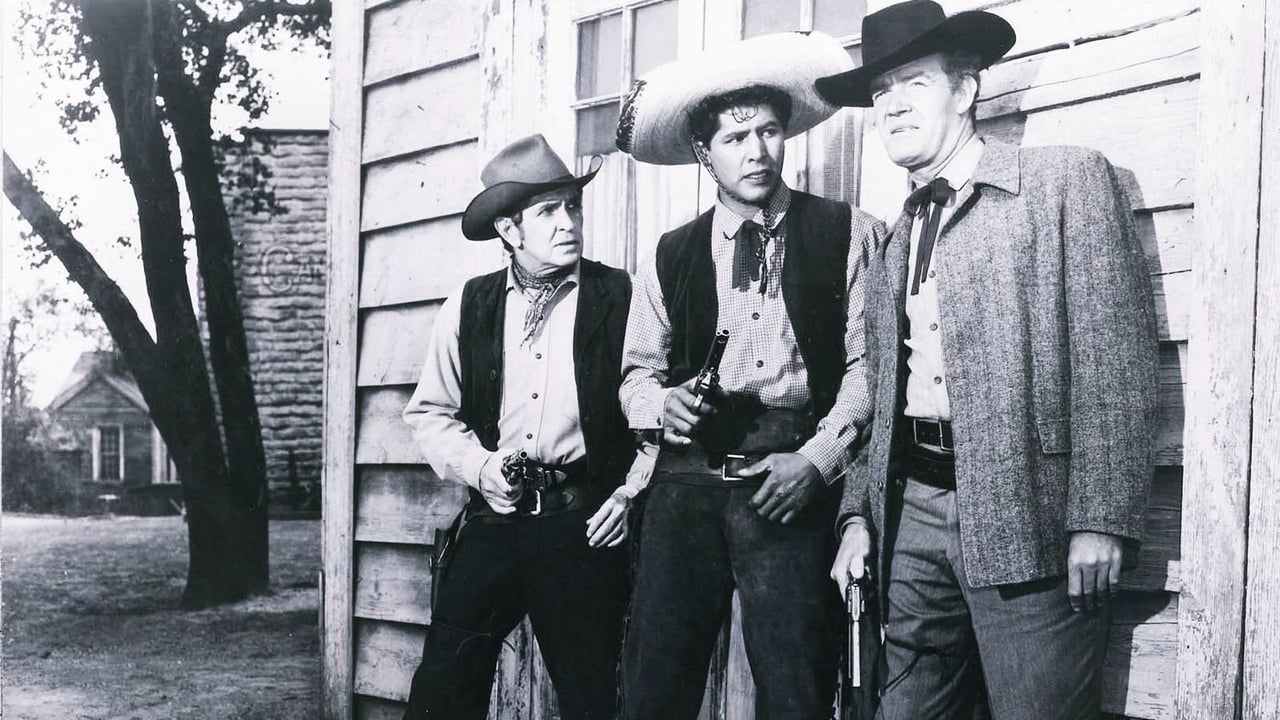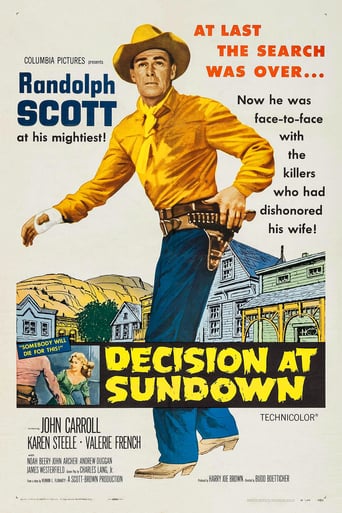

What a beautiful movie!
... View MoreLet's be realistic.
... View MoreGood , But It Is Overrated By Some
... View Moredisgusting, overrated, pointless
... View MoreDirector Budd Boetticher's third western with Randolph Scott, "Decision at Sundown," with John Carroll, Andrew Duggan, Noah Beery, Jr., and Karen Steele, qualifies as the most unusual of Scott's B-movie horse operas. Randy doesn't play a lawman this time around, but he is a drifter with a mission. As former Confederate soldier Bart Allison, our steely hero lost a wife because of the shenanigans of Tate Kimbrough (John Carroll of "The Flying Tigers"), and Allison has been searching for Kimbrough. Another amiable Texan, Sam (Noah Beery Jr. of "The Savage Horde"), has been riding with Allison, and he knew all about Bart's wife that Bart never knew. They track Kimbrough down to the town of Sundown where Kimbrough presides over the town as the boss. When our heroes ride into Sundown, Bart is bound for Tate Kimbrough's wedding to Lucy Summerton (Karen Steele of "Ride Lonesome"), while Sam sticks around and waits on him. Before Bart shows up at the wedding chapel, Sam and he hit the local saloon for a couple of drinks, and they find Kimbrough's cronies getting liquored up on free whiskey. Allison and Sam want to join in for a drink, but Allison doesn't want to accept anything from the unscrupulous Kimbrough so he places coins on the bar. The town marshal (Andrew Duggan of CBS-TV's "Lancer") called Swede irritates Bart when our protagonist wants to pay for his drinks. Bart openly challenges the Swede, and the Swede drops Bart's coins into a spittoon. Later, at Kimbrough's wedding, Bart raises an objection during the ceremony, and he tells Kimbrough's bride Lucy that she will be a widow at sundown. Everything goes sideways then at a gunfight breaks out our heroes taken refuge in the local livery stable. Kimbrough's gun flunkies lay siege to the place and fill the air with whistling lead. Interestingly, one of Kimbrough's hired gunmen is none other than the legendary actor Bob Steele. For the better part of "Decision at Sundown," Bart and Sam are trapped in the stable. Slowly, but inevitably, the townspeople of Sundown realize that they have been taken advantage of by Kimbrough, and they decide to take a stand against him. Foremost of these citizens is a rancher, Morley Chase (Ray Teal of NBC-TV's "Bonanza"), who stands up to Kimbrough, and later disarms Kimbrough's men so Bart can shoot it out with the Swede. Naturally, Bart blast the Swede right out of his boots, but at the same time, he loses the use of his hand. Now, he must face Kimbrough and use his other hand in a duel. Kimbrough and Allison are sworn adversaries, and Allison loses his best friend, Sam, when the fellow Texan leaves him to get a hot, cooked meal. Sam's death in part prompts Chase' decision to oppose Kimbrough. Once the citizens rise up against Kimbrough, his influence in Sundown begins to crumble. Randolph Scott plays a different role for a change, and he loses his cool as the lead character. This isn't the icy cool cowboy in Boetticher's other westerns, "Ride Lonesome," "Comanche Station," and Buchanan Rides Alone." Boetticher confines this oater to the city limits, and we watch as Kimbrough's power slips, until he feels compelled to square off against Allison in the street at dusk. The showdown never comes because the other woman in town, Ruby James (Valerie French of "Jubal") intervenes. She has been Kimbrough steady woman for years until he took up with Lucy, and they have a special bond. Eventually, Lucy decides not to marry Kimbrough. The thing is that Allison never gets the pleasure of killing Kimbrough. "Decision at Sundown" is a good, off-beat western, competently made, with Randolph Scott at his very best.
... View MoreTowards the end of his career, Randolph Scott did something rather risky for a film hero--but it did pay off in some terrific films. In "Decision at Sundown" and "Ride the High Country", Scott played a character who wasn't exactly a good guy--but a more complex man filled with good and bad. I liked this because although I love Randolph Scott westerns, there is a certain sameness to many of them--a certain formula. Seeing the formula upset a bit is a big plus for this film.The movie begins with Scott and his friend (Noah Beery, Jr.) coming to a town where a wedding is about to occur. Just before the bride and groom are joined, Scott shows up and announces that the wedding must stop AND that he plans on killing the groom because he deserves to die! Personally, this seemed rather stupid as the town, not unexpectedly, is quite sore at him. However, their reaction is even more severe--they chase the two men into a building and threaten to kill them if they come out into the streets! Eventually you learn two things. First, Scott is angry at the groom (John Carroll) because Carroll was cheating with Scott's wife. However, through Beery, you also learn that Scott's wife was no angel--and Carroll was not her first affair! Second, you learn that Carroll and his sheriff pretty much control the town...and slowly the townspeople start to question what is now happening--especially after Beery is shot down AFTER he peacefully leaves and steps out of the fight! To see what happens next, try watching the film--you'll be glad you did.With director Budd Boetticher and Randolph Scott...how could this film help but be terrific?! Not their best together, but awfully close.
... View MoreA very angry Randolph Scott and his sidekick Noah Beery Jr. ride into the town of Sundown. Everyone is abuzz about that day's wedding of it's most prominent citizen John Carroll, a man Scott has unfinished business with and ends up sparking a city-wide rebellion against.Another great collaboration between Scott and director Budd Boetticher, this offbeat and uncompromising western melodrama has a lot to say about the deadly sin of pride and the complications involving these two men afflicted with it.The climax and the final scene are really surprising and unique in that during the whole movie, it's Scott's pride that leads him to try and kill Carroll and it's that same pride that prevents him from carrying it through after Carroll's wounding by a third party.In the end, it's strange to see a western where the villain lives, leaving town with his head bowed, cured of his delusions of grandeur, while the hero wanders off in a drunken, blustery fit of anger, consumed bu his own self-righteousness.As with other films from Boetticher, this is visually stunning, with wonderful composition and great use of color. With most of the action taking place in town, there isn't much of Boetticher's usually well-photographed scenery, but the sets and costumes (especially Scott's cool leather jacket) look great.
... View MoreThis film pretty much maintains all its scenes within the town of Sundown, where Bart Allison (Randolph Scott) and his partner Sam (Noah Beery) arrive on the day of the marriage of Tate Kimbrough (John Carroll) to Lucy Summerton (Karen Steele). As such, it lacks the scenic outdoor beauty that a lot of 50s westerns took advantage of, and instead builds up a more or less interesting story behind the vengeful character played by Scott. The town of Sundown is under the control of Kimbrough who's marrying Lucy though his real girlfriend is Ruby James (Valerie French) who works at the saloon. The film is a little to staged but features a well drawn out gunfight where Scott and Beery are holed up in a livery stable while Kimbrough's men shoot out the windows from various strategic locations. For a western, Scott's role is quite extraordinary, and though you think all of the characters are stereotypes, the story expands enough to give them some interesting individuality.
... View More